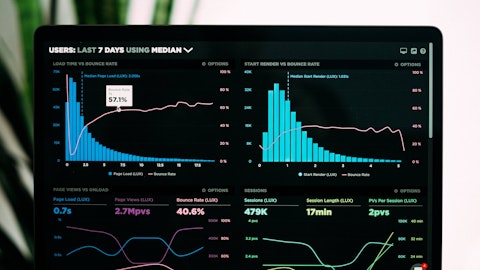In this piece, we will take a look at the 10 best telecom stocks to buy right now.
The telecommunications industry is at a critical juncture as it navigates an era of rapid technological advancement and escalating data demands. Over the coming years, global data consumption is expected to surge dramatically, nearly tripling from 3.4 million petabytes (PB) in 2022 to 9.7 million PB by 2027. This massive increase is driven largely by the growing consumption of video content, which will account for approximately 79% of this data. Despite this exponential rise in data usage, telcos face a challenging financial landscape. Revenue growth from internet access is projected to remain modest, with a compound annual growth rate (CAGR) of only 4%, reaching $921.6 billion by 2027. This slow revenue growth contrasts with the substantial capital required for network upgrades and expansions.
According to PWC report “Perspectives from the Global Telecom Outlook 2023–2027”, to meet the rising data demand and stay competitive, telecommunications companies will need to invest heavily in infrastructure. The ongoing transition to 5G technology and the deployment of other advanced network standards will drive significant expenditures. By 2027, telcos are expected to invest around $342.1 billion in network enhancements. This includes the expansion of fibre networks and the adoption of Open Radio Access Networks (Open RAN), which aim to improve interoperability among devices and providers.
In response to these evolving demands, telcos are increasingly focusing on diversifying their service offerings beyond traditional connectivity. The Internet of Things (IoT) represents a major growth opportunity, with expectations for a substantial rise in connected devices. The number of IoT devices is projected to increase from 16.4 billion in 2022 to 25.1 billion by 2027. This growth will be driven by innovations in various sectors, including healthcare, where medical IoT devices are anticipated to double, reflecting a CAGR of 16.7%. The expansion of private 5G networks and edge computing services will further enhance the capabilities of telcos to meet the diverse needs of their business customers.
The shift towards advanced technologies like 5G presents both opportunities and challenges. The initial wave of capital expenditures on 5G infrastructure is nearing its peak, with future investments likely to focus on optimizing and scaling existing networks rather than extensive new deployments. This trend is expected to impact the financial strategies of telecom companies, as they will need to manage substantial investments while also seeking efficiencies and cost control. The growth in capital expenditure for 5G and fibre infrastructure will be accompanied by a rising focus on operational efficiency and monetization strategies.
In addition to network enhancements, telcos will need to foster collaboration across the broader ecosystem to thrive in this evolving landscape. Partnerships with technology providers, cloud services, and other stakeholders will be crucial for developing and delivering advanced services. Companies that excel in integrating these diverse technologies and creating seamless solutions will be better positioned to capture emerging opportunities in areas such as private networks and digital infrastructure.
In conclusion, the telecom industry is entering a period of significant transformation, characterized by rapid technological advancements and evolving consumer demands. To succeed, telcos must navigate the complex challenges of heavy investment requirements while exploring new growth avenues. Strategic partnerships, operational efficiency, and a focus on innovative technologies will be essential for companies aiming to excel in this competitive and dynamic environment.

Our Methodology
We used telecom sector ETFs plus online rankings to compile an initial list of the best telecom stocks to buy now. We narrowed our list to the 10 stocks that analysts see the most upside to. The list is sorted in ascending order of analysts’ average upside potential, as of August 13. Note: We only included companies whose primary business is in the telecom industry.
At Insider Monkey we are obsessed with the stocks that hedge funds pile into. The reason is simple: our research has shown that we can outperform the market by imitating the top stock picks of the best hedge funds. Our quarterly newsletter’s strategy selects 14 small-cap and large-cap stocks every quarter and has returned 275% since May 2014, beating its benchmark by 150 percentage points (see more details here).
10. Charter Communications, Inc. (NASDAQ:CHTR)
Average Analyst Share Price Target Upside: 1.38%
Average Analyst Share Price Target: $360.93
At number ten on our list of 10 best telecom stocks to buy right now is Charter Communications, Inc. (NASDAQ:CHTR). Charter Communications, Inc. (NASDAQ:CHTR) has an average analyst price target of $360.93, reflecting a modest upside of 1.38%, indicating limited near-term growth expectations. On July 29, Evercore ISI raised its price target for Charter Communications, Inc. (NASDAQ:CHTR) to $425 from $350, maintaining an Outperform rating. Despite a challenging environment, Charter Communications, Inc. (NASDAQ:CHTR) exceeded expectations in key financial metrics. The anticipated negative impact from the sunset of the Affordable Connectivity Program (ACP) in Q2 was less severe than expected. While there’s some uncertainty about non-pay churn in Q3, it appears manageable. Charter’s core broadband trends remain stable, with strong mobile net additions and positive standalone mobile EBITDA. Management’s expense control and a slight reduction in the capex forecast were also noted, with a positive outlook for the second half of 2024 and 2025 supported by healthy broadband APRU growth.
On July 26, Charter Communications, Inc. (NASDAQ:CHTR) delivered strong quarterly results, with both EPS and revenue surpassing expectations. The company reported a normalized EPS of $8.49, beating estimates by $0.49. Revenue also impressed, reaching $13.69 billion, outpacing projections by $89.61 million. These results highlight Charter Communications, Inc. (NASDAQ:CHTR) robust performance and ability to navigate a challenging environment, reinforcing investor confidence in its growth trajectory.
Parnassus Value Equity Fund stated the following regarding Charter Communications, Inc. (NASDAQ:CHTR) in its first quarter 2024 investor letter:
“During the quarter, we added new positions in Pfizer, NICE and Charter Communications, Inc. (NASDAQ:CHTR). NICE is a leading cloud contact center software company. Charter’s stock had fallen due to near-term concerns, which we believe will not have a major impact on the long-term value of the business. Charter Communications has had several issues that created short-term uncertainty. We assessed that these issues have limited impacts on the long-term value of the business and initiated a position to take advantage of the stock’s historically low valuation.”
09. T-Mobile US, Inc. (NASDAQ:TMUS)
Average Analyst Share Price Target Upside: 1.94%
Average Analyst Share Price Target: $198.63
T-Mobile US, Inc. (NASDAQ:TMUS) has an average analyst price target of $198.63, offering a slight upside of 1.94%, suggesting steady but limited potential for near-term gains. On August 13, in a strong show of market confidence, T-Mobile US, Inc. (NASDAQ:TMUS) stock hit a new all-time high at $195.33. This achievement highlights the company’s substantial growth over the past year, with its stock value surging by an impressive 40.02%. On July 31, T-Mobile US, Inc. (NASDAQ:TMUS) announced its latest quarterly earnings, reporting a normalized EPS of $2.50, beating estimates by $0.21. The company also delivered strong revenue of $19.77 billion, surpassing projections by $200.33 million. These results underscore T-Mobile US, Inc. (NASDAQ:TMUS) continued momentum and ability to outperform in a competitive market, further solidifying its position as a leading player in the industry. Analyst firms Barclays, TD Cowen, Scotiabank, and RBC Capital have all raised their price targets for T-Mobile US, Inc. (NASDAQ:TMUS), signaling strong confidence in the company’s growth prospects.
T-Mobile US, Inc. (NASDAQ:TMUS) offers a forward dividend yield of 1.33%, with an annual payout of $2.60 and a payout ratio of 30.93%. The last announced dividend was $0.65, with an ex-dividend date of August 30, and a payout date scheduled for September 12.
ClearBridge Dividend Strategy made the following comment about T-Mobile US, Inc. (NASDAQ:TMUS) in its Q3 2023 investor letter:
“During the quarter we initiated positions in two new names: T-Mobile US, Inc. (NASDAQ:TMUS) and Gilead Sciences. T-Mobile is the best-in-class player in the wireless space, delivering the strongest growth with the lowest cost structure and the best consumer proposition. T-Mobile’s strength is rooted in its advantaged competitive position. Its superior spectrum holdings enable it to provide better wireless service at meaningfully lower cost. T-Mobile’s annual capital expenditures run about $10 billion, on the order of half the amount its peers must spend. Due to its lower cost structure, T-Mobile can undercut its competitors on price while still generating compelling profitability and returns.
This combination — superior service at lower prices — has enabled T-Mobile to outgrow its competition. In the three years since completing its merger with Sprint, T-Mobile has grown its post-paid subscriber base by about 22%. Over the same period, AT&T’s has grown by about 14%, while Verizon’s by less than 5%.
Given the high fixed-cost nature of the wireless business, these steady increases in revenue growth have led to outsize increases in profits and free cash flow. Free cash flow in 2023 is expected to come in around $13.5 billion, up from less than $8 billion last year. In 2024 free cash flow is expected to grow by over 20% to approximately $17 billion — providing a 10% yield based on today’s stock price.
We have long admired T-Mobile, but until recently the stock did not pay a dividend. The company announced its inaugural dividend in September, and we bought the stock shortly thereafter. The initial yield is about 2% and it is expected to grow about 10% per year.”
08. American Tower Corporation (NYSE:AMT)
Average Analyst Share Price Target Upside: 2.14%
Average Analyst Share Price Target: $230.42
At number eight is American Tower Corporation (NYSE:AMT) which has an average analyst price target of $230.42, indicating a modest upside of 2.14%, reflecting cautious optimism about the company’s near-term growth potential. On August 13, Citi raised its price target for American Tower Corporation (NYSE:AMT) from $215 to $255, maintaining a Buy rating. Citi anticipates American Tower Corporation (NYSE:AMT) will meet its 2024 financial goals despite potential fluctuations from its India divestiture. The firm expects enhanced growth prospects and financial flexibility by 2025, which could lead to increased returns or strategic acquisitions. Citi’s upgraded target reflects lower interest rates and a premium for strong portfolio performance, especially in developed markets. Overall, Citi remains confident in American Tower Corporation (NYSE:AMT) future performance and strategic positioning.
American Tower Corporation (NYSE: AMT) offers a forward dividend yield of 2.87%, with an annual payout of $6.48 and a payout ratio of 60.75%. The company has a 5-year dividend growth rate of 13.71% and has increased its dividend for 11 consecutive years. On July 30, American Tower Corporation reported strong quarterly results, with normalized FFO of $2.89, beating estimates by $0.30. Revenue of $2.90 billion also surpassed expectations by $83.42 million. These results highlight the company’s solid performance and financial strength, reinforcing its positive growth outlook. American Tower Corporation (NYSE:AMT), however, has a year-to-date price return of 3.14%, lagging behind the S&P 500’s 13.93% return. This suggests that while American Tower Corporation (NYSE:AMT) has shown modest gains, it has underperformed relative to the broader market index.
ClearBridge Global Infrastructure Value Strategy stated the following regarding American Tower Corporation (NYSE:AMT) in its first quarter 2024 investor letter:
“Portuguese renewables utility Energias de Portugal (EDP) and U.S. communications company American Tower Corporation (NYSE:AMT) were among the largest detractors. American Tower is a leading independent owner, operator and developer of wireless and broadcast communications infrastructure. The company has 41,000 sites in the U.S. and a further 139,000 sites across 19 countries, predominantly emerging markets (75,000 in India, 40,000 in Latin America and 18,000 in Africa). Shares underperformed as the market favored more cyclical sectors, while tower stocks, being notably sensitive to interest rates, experienced further declines due to the uptick in bond yields.”





